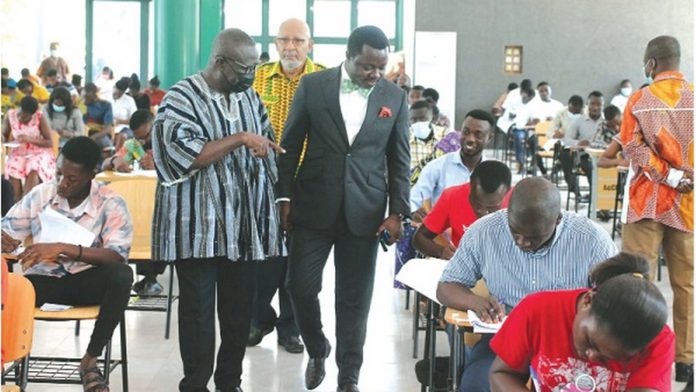Trained teachers from the Colleges of Education performed better than those from the universities in the Ghana Teacher Licensure Examination (GTLE) so far conducted, a research has revealed.
According to the study conducted by a team of six researchers from the University of Education, Winneba (UEW) from 2021 to 2022, the pass rate of those from the colleges was 79 per cent, while that for those from the universities was 71 per cent.
The research, which was carried out from August 2021 to February 2022, involved over 3,000 respondents who had written the GTLE from 2018 to 2021.
A senior lecturer in Curriculum and Pedagogy at the UEW, Dr Richardson Addai-Mununkum, who presented the research report on An Evaluation of the GTLE in Accra Thursday, told the Daily Graphic’s Emmanuel Bonney that the results were interesting.
He said the purpose of the research was to evaluate the GTLE against its original purpose, identify emerging challenges and make recommendations for improvement.
Ghana Teacher Licensure Examination
The GTLE was introduced by the government in 2019, backed by the Education Act of 2008, Act 778, with the first-ever teacher licensure examination taking place in September 2018.
It is an examination organised to license and certify all professional teachers in Ghana as a key policy aimed at improving the professional standing and status of teachers in the country.
Organised and supervised by the National Teaching Council (NTC), the licensure examination is also aimed at building the expertise of teachers in the field of teaching and preparing them for appointments outside the country.
It covers new teachers entering the service, as well as teachers already in active service who also require the licence to practise the profession successfully.
The examination is conducted in three areas — Essential Professional Skills (EPSs), Literacy and Numeracy — after which successful candidates qualify for recruitment into the Ghana Education Service (GES) and posting.
Interesting findings
Dr Addai-Mununkum said the results were interesting because in terms of societal positioning, “we assume that the universities are higher and so we expect their candidates for the GTLE to do better”.
“So it is interesting that the colleges are actually doing better at the licensure. The reason we found was that the colleges really prepared the learners in relation to the National Teachers Standards (NTS), while in the universities a lot of programmes focused so much on the content areas,” he said.
He also said 53 per cent of those who took the examination but failed said it was a good exercise.
He added that about a quarter of the respondents had reservations about the numeracy aspect of the GTLE, since they needed to pass all three areas — EPSs, Literacy and Numeracy — before getting the licence.
He explained that the average pass rate of the GTLE was about 76 per cent, noting that, for instance, if someone was doing Geography, the person did a lot more courses in the area and fewer courses in Education and so by the time they “go out, they are not as competent in terms of professional knowledge and skills as it is with those who go to the colleges”.
Concerns
Dr Addai-Mununkum indicated that while respondents did not have any issues with the EPSs and the Literacy aspects of the examination, most of them had reservations with writing the Numeracy aspect.
Their reason, he said, was that they went to the colleges or the universities to specialise, for instance, in Literature in English, and that was what they were going to teach, asking: “Why is it that you want to examine me on numeracy?”
“Also, if somebody read Ga and specialised in that area, when the person goes out, he/she is going to teach Ga, and wonder how they need numeracy to do that. That is where they had a lot of reservations,” he said.
Recommendations
In their recommendations, the researchers said the universities would have to take a re-look at their curricula in relation to the NTS and ensure that their products were able to improve on their performance.
“The recommendation is that the universities should begin to take a re-look at their curricula in relation to the NTS.
“When the standards came, the colleges embraced them; they reformed their curricula and they are working with the standards. The universities are yet to reform their curricula in line with the NTS. So that is where the difference is coming from,” Dr Addai-Mununkum emphasised.
The universities, the report further recommended, would have to reconsider their teacher preparation curriculum and look at whether they were aligning with the NTS and adjust accordingly for their products and graduates.
Dr Addai-Mununkum said although the processes and procedures for the conduct of the GTLE were fit for purpose, there were a few challenges associated with registration and test administration, and that the NTC could increase test-takers’ choice of centres for the writing of the GTLE and improve orientation and training of supervisors and invigilators.
Stakeholders’ perception of the GTLE, he said, was positive.
“However, given some of the misconceptions expressed, the NTC should undertake sensitisation and publicity campaigns on the GTLE. Such campaigns may include stakeholder fora and a documentary that could be aired on national television for a period,” he said.
Need for evaluation
The Registrar of the NTC, Dr Christian Addai-Poku, said the essence of the research was that after the introduction of the examination, it was necessary to evaluate the entire intervention, as there had been diverse opinions on whether it was right to do it, its timing, as well as whether it was living up to expectation.
“So there was the need to conduct this research to evaluate it to know our strengths and weaknesses in order to inform policy reforms,” he said.
He said although there had been seven editions of the examination, the study was conducted on four.

